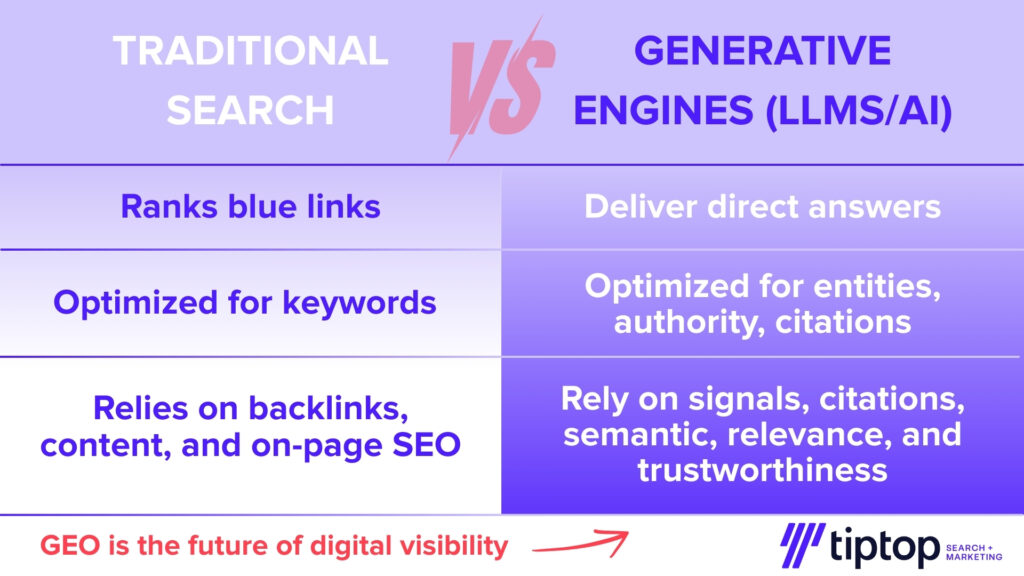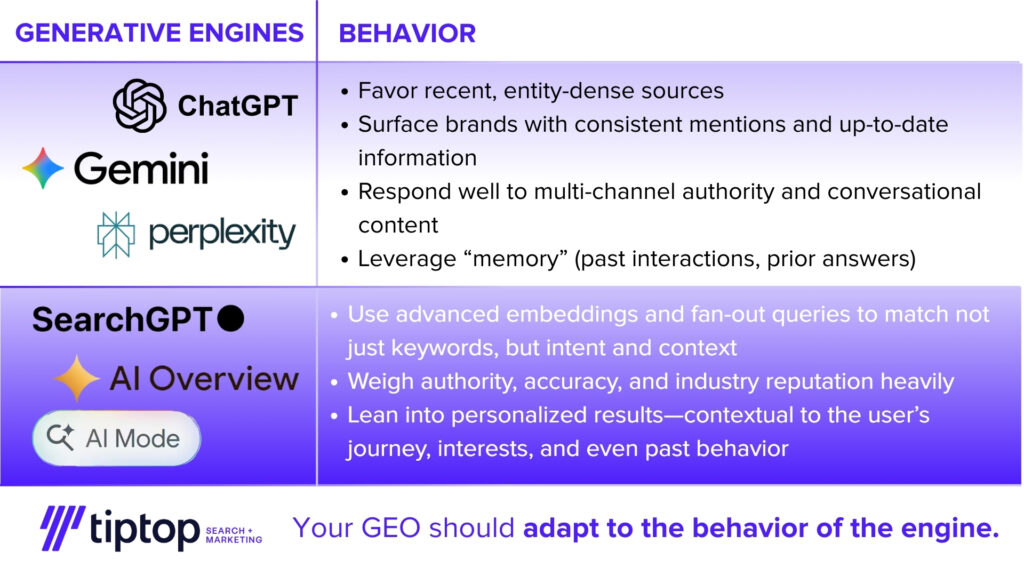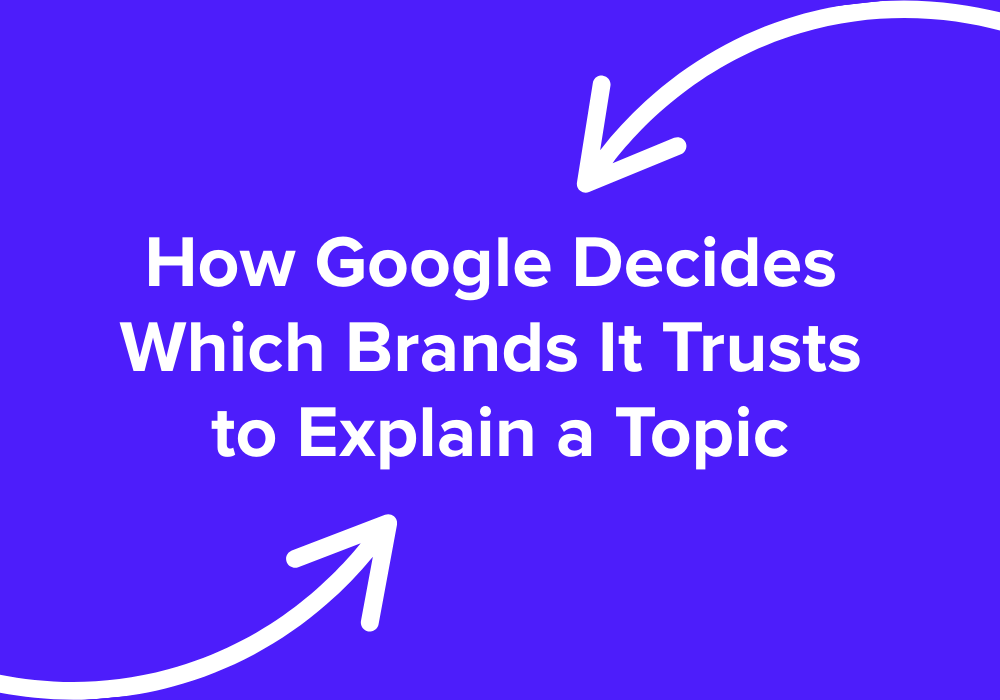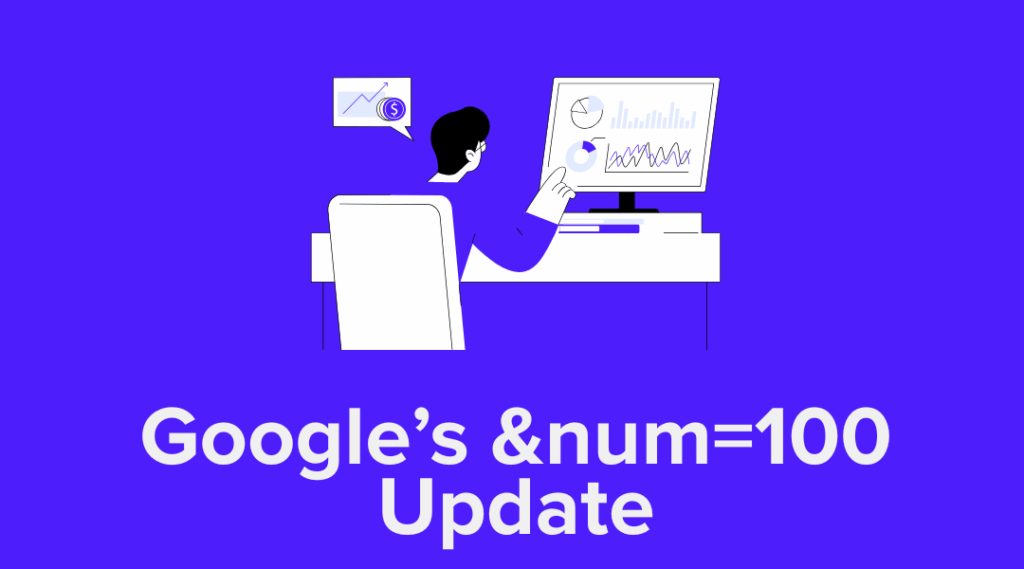Summary:
Generative Engine Optimization (GEO) is about earning your brand a place in the answers and recommendations generated by AI—not just in search rankings. To win, focus on building clear authority, entity-rich content, and off-page signals that LLMs and generative engines can recognize and trust.
SEO isn’t what it used to be—and neither are your customers. In 2025, more buying journeys start (and end) inside AI-powered engines like ChatGPT, Google’s AI Overviews, Gemini, and Perplexity than ever before. Brands are waking up to a hard truth: If you aren’t surfacing (and cited) by these generative engines, you’re losing out on visibility to your future customers and missing conversion opportunities
Welcome to the era of Generative Engine Optimization (GEO)—the strategy that gets you found, chosen, and remembered in the channels shaping tomorrow’s winners.
What is generative engine optimization?
Generative Engine Optimization (GEO) is the strategic practice of making your brand visible and relevant within large language models (LLMs) and AI-powered search engines.
While traditional SEO focuses on ranking in traditional Google’s results (the 10 blue links), GEO is about earning your place inside the answers, recommendations, and overviews generated by AI-powered search features and platforms.
This means:
- Optimizing for citations and mentions by engines like ChatGPT, Gemini, and Perplexity—not just for “rankings”
- Creating content and digital signals that build the authority and entity strength AI models rely on
- Ensuring your brand surfaces in Google’s AI Overviews (AIOs) and similar generative experiences—where the answer itself is the new click
GEO is where technical SEO, content, digital PR, brand authority, and entity optimization converge. It’s no longer enough to simply appear; you have to be trusted, cited, and selected by AI as the definitive source.
Why GEO matters now
There’s a tectonic shift underway in how people seek out information, research solutions, and make purchase decisions:
- User journeys have changed: Many consumers now start their search inside generative platforms, expecting instant, contextual, and authoritative answers.
- AI is the new gatekeeper: Generative engines “decide” what gets surfaced, summarized, and recommended—picking winners and shaping opinions in the process.
- First-movers have an edge: Brands investing in GEO today are already seeing real gains in citations, awareness, and traffic—while those relying on old playbooks are getting left behind.
- This is just the beginning: AI-driven search is evolving fast. GEO isn’t a fad—it’s foundational for staying relevant in digital.
GEO puts you at the center of this transformation. It helps your brand earn trust and drive outcomes in every new channel that matters.
This is the perfect moment to pause, clarify, and further add context. 1) Google is not dead – it still drives the lion's share of clicks. 2) Google is not the Google we once knew. Much of the features in Google, like AI overviews, use generative engines, and Gemini powers AI Mode. These features are increasing the number of zero-click results, making brand visibility and citation critical. Generative is and will be the future of search – GEO is what helps position you for this.
Generative engines vs. classic search: what’s the difference?
Many marketers still think in terms of keywords, rankings, and backlinks. But generative engines operate differently.
Instead of serving up a list of links, they generate answers, recommendations, and even purchase advice—often drawing from a pool of trusted brands, products, and sources.

Google AI Overviews, AI Mode, and the future of search
Google’s AI Overviews and rapidly expanding AI Mode are reshaping user behaviors. These tools aggregate, synthesize, and present information directly to users, often bypassing the traditional search results altogether and eliminating a huge number of clicks to websites.
- AI Overviews create rich, multi-source answers that may cite, quote, or highlight brands above the “top” organic listings.
- AI Mode unlocks a more conversational, context-aware experience—where search becomes a dialog, and the most relevant, trustworthy sources win out.
- Personalization and memory: Increasingly, generative engines use query fan outs, vector embeddings, and stored “memories” to understand user intent and history—making every answer more tailored and contextual than ever before.
Brands that align their digital presence with these engines’ criteria are far more likely to be surfaced and recommended at key decision points.
Learn more about content strategy in the age of AI overviews →
How generative engines “rank” brands
Unlike classic algorithms, generative engines are trained to “think” in terms of entities and relationships. Generative engines scan the entire web, weighing a mix of trust, relevance, and authority signals. Rather than focusing on keywords alone, they look at the depth and breadth of your brand’s footprint—both on your own site and everywhere else you appear. They choose which brands to cite based on a blend of:
- Entity strength: Is your brand a recognized authority in its space? Do you “own” the topics and conversations that matter to your ICP?
- Off-page signals: Are you being referenced, reviewed, or cited by credible, third-party sources?
- Citation frequency: How often is your brand mentioned by others, especially in a way AI can easily parse (clear names, proper context)?
- Content quality: Are your answers accurate, well-structured, and written for both humans and AI engines?
- Semantic relationships: Does your content align with the broader web of related entities, products, and industry terms?
- Trust and reputation: Do you consistently appear as a trustworthy source across channels—media, reviews, thought leadership, and more?
The signals generative engines value most
Success in GEO comes down to being discoverable, credible, and relevant—everywhere your audience and the algorithms look. Here’s what matters most:
- Explicit citations: Named mentions, structured data, and clear references that LLMs can recognize and connect to your brand.
- Entity-rich content: Using the specific terms, questions, and topics your ICP (and the algorithms) care about.
- Depth and topical authority: Covering your subjects so thoroughly that engines “choose” you over generic content.
- Consistency: A digital presence that’s reinforced across your site, socials, press, and partnerships.
Optimization in practice:
- Writing style: Clear, direct, and formatted for AI—using headings, lists, FAQs, and answers to real user questions.
- Content structure: Segmenting “chunking” information so it’s easily “digestible” by both readers and LLMs.
- Off-page authority: Proactive PR, unlinked brand mentions, and signals from high-authority industry sources.
- Technical readiness: Schema, structured data, and a healthy site foundation.
How optimization varies: ChatGPT, Search GPT, Perplexity, and Google
No two generative engines are exactly alike. Each one “reads” and weighs your content, authority, and reputation a bit differently, so the best strategy is always layered and channel-specific.
Here’s a quick breakdown of what sets the major engines apart, and how your GEO approach should adapt:
- ChatGPT / Gemini / Perplexity:
- Favor recent, entity-dense sources
- Surface brands with consistent mentions and up-to-date information
- Respond well to multi-channel authority and conversational content
- Leverage “memory” (past interactions, prior answers)
- Search GPT / Google AI Overviews / Google AI Mode:
- Use advanced embeddings and fan-out queries to match not just keywords, but intent and context
- Weigh authority, accuracy, and industry reputation heavily
- Lean into personalized results—contextual to the user’s journey, interests, and even past behavior

Personalization, AI memory, and targeting your ICP
As generative engines evolve, they’re moving toward hyper-personalization—tailoring recommendations, answers, and even purchase advice based on the individual user. That means brands must get laser-focused on their ICPs, messaging, and digital signals.
- Content and off-page strategies should speak directly to your best-fit buyers, using language and topics that resonate deeply.
- Messaging needs to anticipate not just what people search, but why—providing value to both the human and the algorithm.
- Brand authority is built everywhere your audience and the engines might look—not just on your own site.
Action steps: how to win at GEO
Ready to take the lead? Generative Engine Optimization is both an art and a science, but a focused, systematic approach will set your brand apart.
- Audit your generative presence: Where (if anywhere) does your brand show up in LLMs, AI Overviews, and generative results?
- Map your entity landscape: What do engines “know” about you, your expertise, and your position in your industry?
- Rebuild content and authority: Develop assets that answer questions, build trust, and reinforce your brand as a go-to source.
- Drive off-page signals: Invest in PR, thought leadership, and strategic partnerships that get you cited—everywhere that matters.
- Track and measure across platforms: Don’t just watch rankings; monitor citations, AIO wins, and generative channel traffic.
tiptop’s C.L.A.R.I.T.Y. framework for GEO
At tiptop, we knew early on that AI and LLMs would disrupt how brands are discovered and chosen. That’s why we developed C.L.A.R.I.T.Y., our AI optimization framework for winning in this new search reality.
C.L.A.R.I.T.Y. at a glance:
- Crawl: Deep dive into your site, off-page presence, and current LLM visibility
- Learn: Map out your brand’s entity relationships and identify gaps
- Analyze: Benchmark brand and competitor mentions across generative engines
- Respond: Create and optimize entity-rich content and assets
- Integrate: Sync GEO with SEO, digital PR, and content strategies
- Train: Educate your team and update processes as AI evolves
- Yield: Measure, iterate, and report on wins across every search surface
Want to go deeper? Read about our C.L.A.R.I.T.Y. framework here →
GEO is the future of digital visibility
Generative Engine Optimization isn’t a buzzword—it’s the roadmap for digital visibility in the era of AI-powered decision-making.
The brands that invest in GEO today will define tomorrow’s winners.
If you’re ready to stop chasing rankings and start being the answer, tiptop is ready to help you get there.
Explore our Generative Engine Optimization services →
Ready to see where your brand stands? Book a strategy call →
You might also like:





